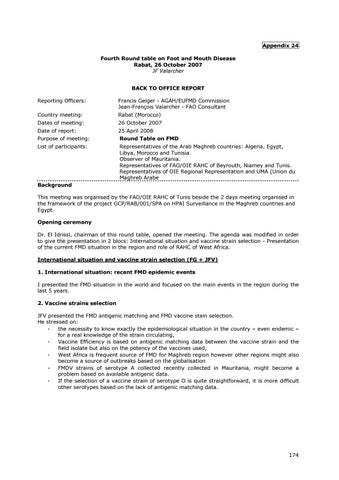Appendix 24 Fourth Round table on Foot and Mouth Disease Rabat, 26 October 2007 JF Valarcher BACK TO OFFICE REPORT Reporting Officers:
Francis Geiger - AGAH/EUFMD Commission Jean-François Valarcher - FAO Consultant
Country meeting:
Rabat (Morocco)
Dates of meeting:
26 October 2007
Date of report:
25 April 2008
Purpose of meeting:
Round Table on FMD
List of participants:
Representatives of the Arab Maghreb countries: Algeria, Egypt, Libya, Morocco and Tunisia. Observer of Mauritania. Representatives of FAO/OIE RAHC of Beyrouth, Niamey and Tunis. Representatives of OIE Regional Representation and UMA (Union du Maghreb Arabe
Background This meeting was organised by the FAO/OIE RAHC of Tunis beside the 2 days meeting organised in the framework of the project GCP/RAB/001/SPA on HPAI Surveillance in the Maghreb countries and Egypt. Opening ceremony Dr. El Idrissi, chairman of this round table, opened the meeting. The agenda was modified in order to give the presentation in 2 blocs: International situation and vaccine strain selection - Presentation of the current FMD situation in the region and role of RAHC of West Africa. International situation and vaccine strain selection (FG + JFV) 1. International situation: recent FMD epidemic events I presented the FMD situation in the world and focused on the main events in the region during the last 5 years. 2. Vaccine strains selection JFV presented the FMD antigenic matching and FMD vaccine stain selection. He stressed on: the necessity to know exactly the epidemiological situation in the country – even endemic – for a real knowledge of the strain circulating, Vaccine Efficiency is based on antigenic matching data between the vaccine strain and the field isolate but also on the potency of the vaccines used, West Africa is frequent source of FMD for Maghreb region however other regions might also become a source of outbreaks based on the globalisation FMDV strains of serotype A collected recently collected in Mauritania, might become a problem based on available antigenic data. If the selection of a vaccine strain of serotype O is quite straightforward, it is more difficult other serotypes based on the lack of antigenic matching data.
174





